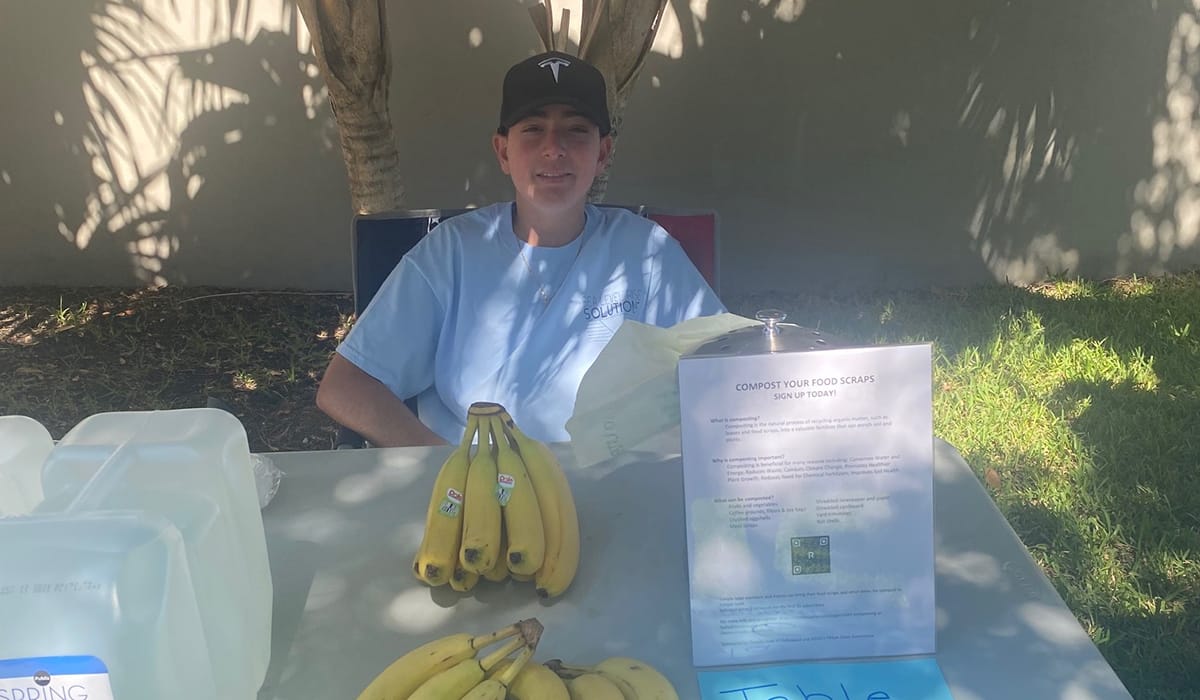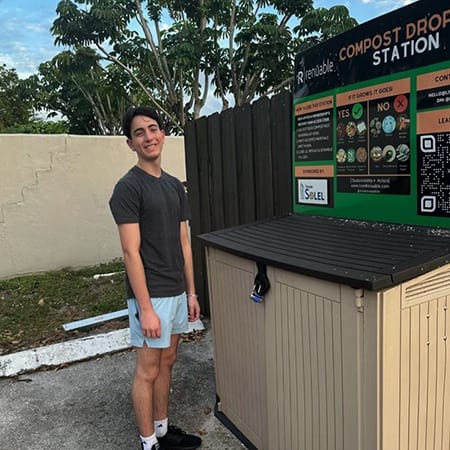Pioneering Sustainable Change With Community Composting

Meet Daily Point of Light Award honoree David Liebowitz. Read his story, and nominate an outstanding volunteer or family as a Daily Point of Light.
At a young age where many are just beginning to form an understanding of environmental issues, David Liebowitz, at just 14, started a community-wide composting program that has since transformed the way his community handles waste. David’s journey began with a simple yet impactful idea: to introduce a composting program within his community. Recognizing the many benefits of composting, including waste reduction and soil enrichment, he approached a centrally located house of worship to host a compost bin. His persuasive discussions with the clergy and the Board about the environmental and community benefits of composting led to the successful placement of the bin.
Understanding the importance of education in fostering sustainable habits, David created an educational program for K-5 students. His approach was both fun and engaging, focusing on teaching children about the importance of composting, which materials can be composted, and how to effectively participate in the process. Beyond his local community, David extended his advocacy efforts to the political arena, lobbying Sen. Rick Scott (R-FL) on the benefits of composting and the need for broader environmental initiatives in Florida.
In less than two years, David’s composting program has led to more than 6,000 pounds of waste being diverted from landfills. This remarkable achievement earned the location the title of “Commercial Client of the Month” in July 2023. David’s vision continues to grow as he engages with a large commercial catering company and a private school to encourage their participation in composting. Furthermore, he is exploring the possibility of expanding the program by adding another compost bin in a different area of his county.
David’s initiative demonstrates the power of youth activism in environmental conservation and highlights how small, local actions can lead to significant, tangible outcomes in waste reduction and sustainability. Read on to find out more about David’s volunteerism.

Tell us about your volunteer role.
I have been volunteering for many years for different causes. One day, I attended an event at Renuable, a community compost site. I had known about the benefits of recycling – and do it at home – but I did not know anyone who composted, and I had never done it before. That day, I learned about the benefits of composting and was inspired and fueled to do more. I approached a centrally located house of worship and asked for permission to place a compost bin on their site. After much back and forth regarding the location, what it would look like and why I wanted to do this, I received permission.
Now, my role is to educate people and to convince them to compost their scraps. I’ve created flyers and social media ads. I also attend community events, where I sit at tables and discuss composting with attendees. I organize games about composting and teach children what they can and cannot compost.
I am proud that in less than two years, over 6,000 pounds of waste have avoided landfills thanks to my compositing efforts. I’ve recruited families to compost in their homes and to bring their compost to our drop-off location. Currently, I am working on bringing more bins to even more locations. I am also extending beyond individual homeowners and working with larger organizations like a catering company and a school, to bring larger amounts of food waste for compost. I’ve enjoyed my journey so far and can’t wait to expand it even more.
Why is this issue so important to you?
According to the Environmental Protection Agency, more food reaches landfills than any other material in our everyday trash. When food scraps go to the landfills, there are many negative consequences like the release of methane which harms our environment, bad odors and harm to wildlife. The food scraps also take up a lot of space.
People can easily reduce food waste by composting their scraps instead of throwing them in the garbage. Composting is a process that allows organic food waste to decompose into nutrient-rich soil. This soil then nourishes other plants. It’s quick and easy to compost. Composting is very much needed to reduce our trash, reduce our costs and help our environment by reducing carbon emissions. I care about leaving a healthier and better planet for my generation and others. All of this is very important to me.
What’s been the most rewarding part of your work?
The most rewarding part of my work has been teaching others about composting in engaging ways. I created a game where children guess whether certain items are compostable or not. I enjoyed creating the game, picking the biodegradable items for the game and then playing it with the children. I add a couple of tricky items, which are always educational and fun. For example, did you know that although K-Cups aren’t compostable, the leftover coffee grounds inside are? Even better, you can buy biodegradable pods. I enjoy teaching others about composting and getting more families to compost their food scraps and other biodegradable items.
What have you learned through your experiences as a volunteer?
In addition to the composting initiative, I volunteer at my local library, for my city’s education advisory committee and at my school. On weekends, I also organize athletic activities for children in foster care. Volunteering keeps me busy and engaged, and I have learned to manage my time wisely. Between my schoolwork and volunteering, I’ve had to prioritize and juggle responsibilities.
I have gained a better understanding of the challenges people might face in adopting an initiative. For example, cost is an issue for some to compost, so I worked with the composting company to create a discounted community rate. I learned how to communicate more effectively, especially when I have to get approval for placing compost bins on private property. I have gained a sense of purpose, as this is an initiative that I think is easy to do and very beneficial.
Volunteering also makes me a happier person. I enjoy meeting new people at events, creating events for children and getting information about how much waste we have helped divert from landfills. And volunteering reminds me of my power and responsibility to get involved in my community.
Why is it important for people to get involved with the causes they care about?
Volunteering can help the community. Many nonprofits have small budgets and rely on volunteers. A volunteer can make a big difference. Being a volunteer can make others more empathetic and understanding of what’s going on around them. Volunteering has also been very rewarding. Knowing that I am saving our environment makes me feel good. I always come home fulfilled, and I think others will as well.
Any advice for people who want to start volunteering?
People should volunteer with causes they think are fun or interesting. There are so many different organizations and causes that can use a volunteer, and volunteering shouldn’t feel like a chore. There are volunteering opportunities outdoors, indoors, locally, internationally, virtually, short term and long term. If someone doesn’t know where to start, they should research reputable organizations, and find out if there are opportunities to help and the time commitment. The Points of Light website is also a great resource. I encourage people to start with one cause and commit to it for a few months. If they don’t like that cause, they can always choose something else.
What do you want people to learn from your story?
People should know that composting is one of the easiest and most impactful ways to help the environment. If you have a garden, adding compost to the soil enhances the soil and reduces the need for chemical fertilizer. If someone can’t compost their food, some companies come to the home to collect compost, and there are compost sites for people to drop off their compost. I encourage people to do an internet search on, “composting sites near me.” I’d love to see more people incorporate composting into their lives. I’d also love to see more people start volunteering for a cause that is important to them.
Do you want to make a difference in your community like David? Find local volunteer opportunities.
